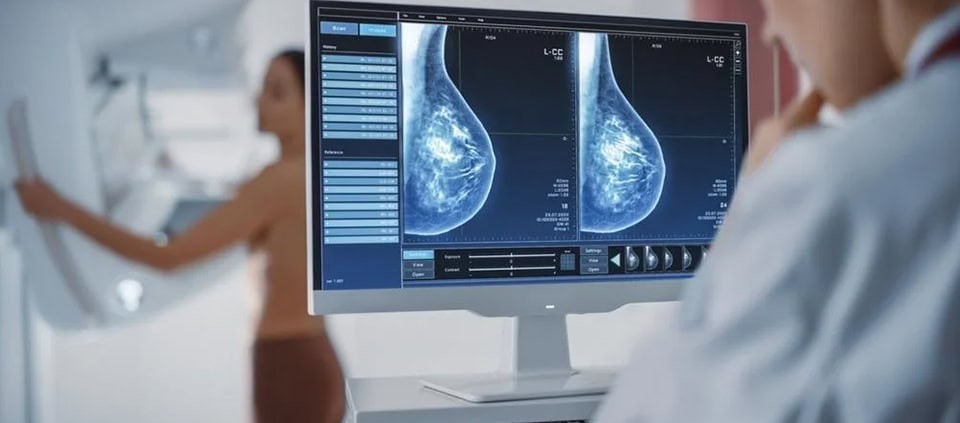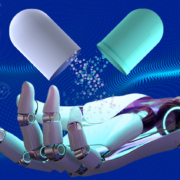Canadian Lab is Using AI to Better Detect Breast Cancer!
AI has been improving healthcare in many areas, but perhaps one of the disciplines where it is making the largest difference is medical imaging. AI’s ability to detect anomalies in medical images such as x-rays and MRIs that are imperceptible to the human eye are vastly improving the diagnostic capabilities of such imaging technologies.
Now, a Canadian lab has announced that it is using AI to improve breast cancer screenings. A lab out of Waterloo, Ont., is taking breast cancer research to new heights by working to help patients get the most beneficial treatment with AI-enhanced imaging technology.
When patients get breast cancer, they typically undergo a type of imaging, like an MRI, to look for cancerous tumors. The Waterloo lab has created “a synthetic correlate diffusion” MRI that is tailored to capture details and properties of cancer in a way that previous MRI systems couldn’t.
“It could be a very helpful tool to help oncologists and medical doctors to be able to identify and personalize the type of treatment that a cancer patient gets,” Alexander Wong, professor and Canada Research Chair in Artificial Intelligence and Medical Imaging at the University of Waterloo told Canadian news outlet the Global News.
Using “synthetic correlate diffusion imagining data,” the new AI-driven technology predicts whether a patient is likely to benefit from neoadjuvant chemotherapy – or chemotherapy that occurs before surgery, according to Wong.
Though the hardware of the actual MRI machine hasn’t changed in this model, what has altered is the way the technology sends “pulses” through the patient’s body and how it collects data, Wong noted.
“The cancer itself just lights up and really shows the different nuances and characteristics around it, which makes it very much easier to identify not only where the cancer is, the size of the cancer, but also the actual tissue characteristics of the cancer to help doctors make better decisions,” he said.
The AI can then analyze the MRI data to help learn whether breast cancer patients could benefit from chemotherapy before surgery in their treatment process.
“It’s essentially the combination of two types of technologies. One is the new MRI imaging technology to really capture the right information. The other is the AI advancement in terms of a deep neural network.”
Deep neural networks are able to continue improving as more information is captured, said Wong.
“The more examples it sees, the better it gets at really identifying these subtle patterns that differentiate from one another. As we train it with more and more data, it’s able to have higher levels of predictive accuracy,” he said.
As to how accurate the AI algorithm is, in a study of nearly 300 patients, Wong said, “The AI, when using our new form of MRI, was able to identify and predict with over 87 percent accuracy which patients would benefit from chemotherapy.
How BigRio Helps Bring Advanced AI Solutions to Healthcare
This new research into improved breast cancer screenings is just one of the many studies that are proving the powerful predictive power of AI and how it can be leveraged to better treat and even prevent injuries and disease.
In fact, improving disease detection and diagnostics is the area where AI is making one of the technology’s biggest impacts.
BigRio prides itself on being a facilitator and incubator for such advances in leveraging AI to improve diagnostics.
In fact, we have launched an AI Studio specifically for US-based Healthcare startups with AI centricity. Our mission is to help AI startups scale and gear up to stay one step ahead of the pack and emerge as winners in their respective domains.
AI Startups face numerous challenges when it comes to demonstrating their value proposition, particularly when it comes to advanced AI solutions for pharma and healthcare. We have taken an award-winning and unique approach to incubating and facilitating startups that allow the R&D team and stakeholders to efficiently collaborate and craft the process to best suit actual ongoing needs, which leads to a faster, more accurate output.
We provide:
- Access to a top-level talent pool, including business executives, developers, data scientists, and data engineers.
- Assistance in the development and testing of the MVP, Prototypes, and POCs.
- Professional services for implementation and support of Pilot projects
- Sales and Marketing support and potential client introductions.
- Access to private capital sources.
BigRio excels in overcoming such initial hurdles, which present nearly insurmountable obstacles to a startup operation.
You can read much more about how AI is redefining healthcare delivery and drug discovery in my new book Quantum Care: A Deep Dive into AI for Health Delivery and Research. It’s a comprehensive look at how AI and machine learning are being used to improve healthcare delivery at every touchpoint.
Rohit Mahajan is a Managing Partner with BigRio. He has a particular expertise in the development and design of innovative solutions for clients in Healthcare, Financial Services, Retail, Automotive, Manufacturing, and other industry segments.
BigRio is a technology consulting firm empowering data to drive innovation and advanced AI. We specialize in cutting-edge Big Data, Machine Learning, and Custom Software strategy, analysis, architecture, and implementation solutions. If you would like to benefit from our expertise in these areas or if you have further questions on the content of this article, please do not hesitate to contact us.









